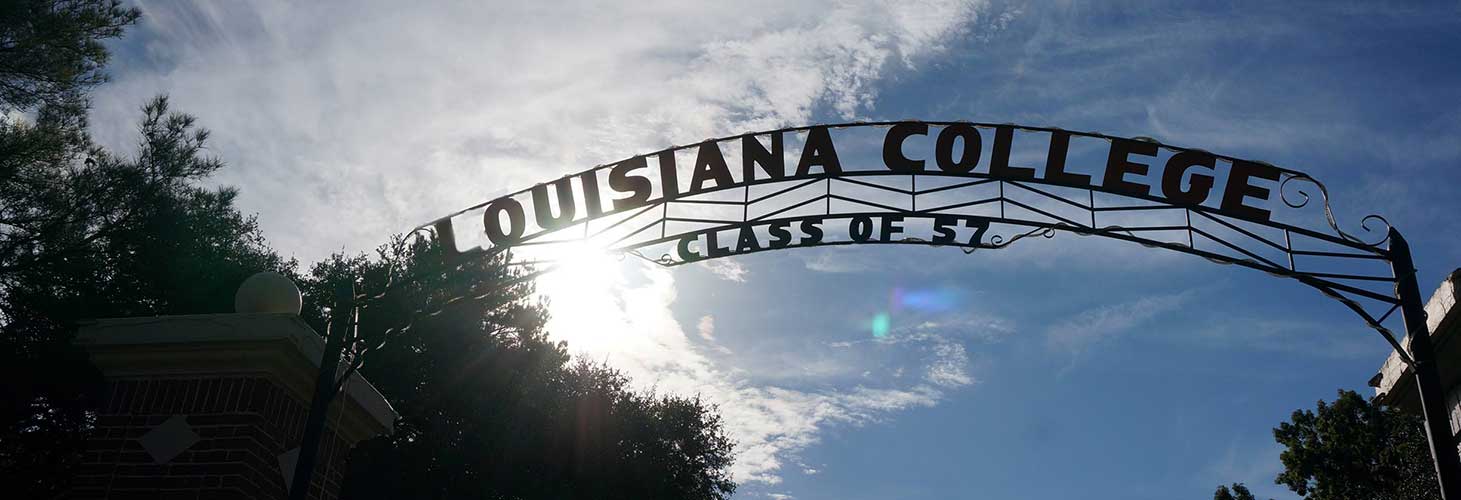By Brian Blackwell, Baptist Message, staff writer
PINEVILLE, La. (LBM) –Louisiana College President Rick Brewer is upbeat about the technological innovations put in place by his faculty and staff since the onset of the coronavirus pandemic, saying the school is well positioned for the future because of their hard work.
Last year, LC was awarded a $2.2 million grant from the U.S. Department of Education, and that has helped students finish the semester through remote learning, he said. The move saved the college more than $100,000 in costs to launch Internet classes that are part of the school’s Center for Online Innovation and Development.
Faculty are able to learn, train and record lectures from inside the newly renovated Faculty Development Center located in the Norton Library.
“We face the most challenging period ever in the history of Louisiana College,” Brewer told the Baptist Message. “We can get there. It’s going to take the Lord’s help. It’s going to Louisiana Baptists’ help.
“We are the only college supported by Louisiana Baptists, through the Cooperative Program, and we are pleased to serve,” he added. “We are a place that’s preparing graduates, transforming lives, and we hope Louisiana Baptists will partner with us by encouraging young people to enroll with us.”
ONLINE INNOVATIONS
“Like all colleges and universities, we were faced with how to go about putting all our face-to-face courses in an online format halfway through the semester,” Brewer said. “We were definitely blessed to have already been working to improve technology on campus. The Lord had begun preparing us for this even though we could not have foreseen it. We are all looking forward to being back on campus in the fall, but we are still working out what that will look like, in accordance to the recommendations of the [Centers for Disease Control and Prevention].”
Brewer said social distancing and other safety precautions are all being considered at this time, and items like hand sanitizing stations, masks and temperature checks will be in place when students return in August.
The fall calendar has been adopted, which has the semester ending prior to the Thanksgiving holiday, so that students who travel home will not risk bringing a potential exposure to the virus back to campus. The calendar includes the removal of Labor Day and fall break that has traditionally been in October.
In addition to classes, online technology has allowed students to use TimelyMD, a program that offers free medical and mental telehealth visits. Launched on March 30, the service provides unlimited, 24/7, free, on-demand access to medical advice or immediate therapy.
Medical professionals can diagnose common conditions and licensed counselors can offer students a safe space to talk about anything at any time, and the health counselors are professionally trained, with some specializing in faith-based counseling.
“We will encourage students to utilize health services when they feel ill or are concerned about things,” Brewer said, noting that the stress of the world events, like COVID-19, means students often need counseling or prayer to get through the day. “It’s a huge benefit of a being in a collegiate community of believers.”
Another online tool used for the first time by the school was Virtual Preview Day, attended by 237 prospective students on April 17.
Prohibited from physically visiting the campus because of attendance restrictions from COVID-19, prospects instead gathered around their internet-accessible devices to engage with professors and students in a live Q and A session via web chat. They also participated in a virtual tour of campus, gained details about classes and degree majors from professors, and, viewed videos of current students who shared why those chose LC.
“This was our first virtual event of this type, and more students responded than had registered,” Brewer said. “This generation of students is so comfortable with social media that I think they enjoyed it more than we anticipated. We will definitely take this into consideration planning future events with online components.”
ENGINEERING INNOVATIONS
Aside from the classroom, LC has used 3D printing technology to produce more than 500 protective face shields and masks, most being N95-style masks.
An hour after Brewer shared in late March on KALB’s “Good Day CENLA” program that Assistant Professor of Engineering Natalie Maxey was producing the devices for much-needed use in hospitals, he received notice that a church wanted to donate $500 to the project. Within 24 hours, donations rose to $5,500. Today, more than $20,000 has been raised to help defray expenses and purchase three additional 3D printers.
Maxey said several other organizations and individuals have helped lead and contribute to the project, as well.
“In all, we’ve provided about 3,000 items of PPE around the state to doctor’s/pediatrician’s offices, dentist offices, the City of Alexandria, hospice care groups, and other facilities,” Maxey said. “We are still receiving requests as more facilities open.”
Brewer said Maxey is one example of how God works miracles even in difficult times.
“Using science and technology to minister with our community and to our community during this crisis has been extremely rewarding,” Maxey said. “This is what “love your neighbor” looked like for us during this season, and I am so grateful God gave us this opportunity.”




